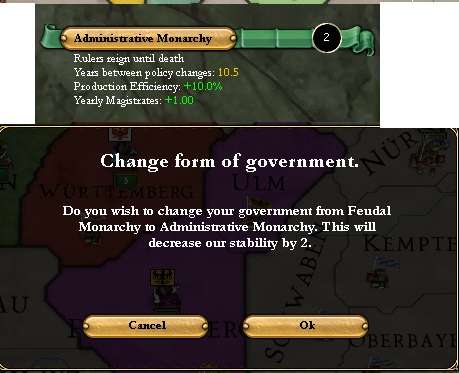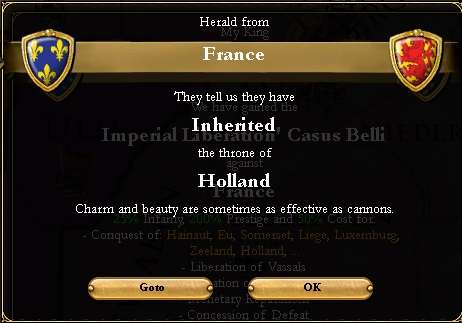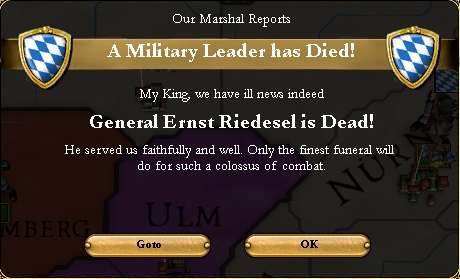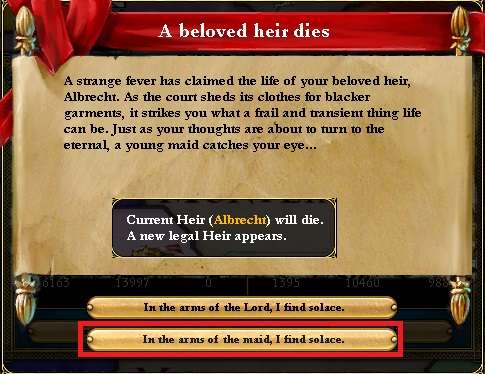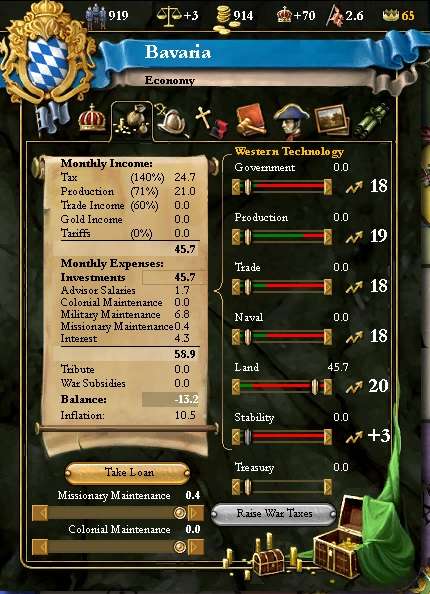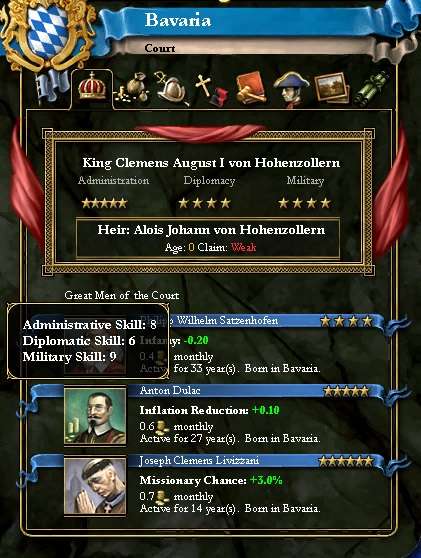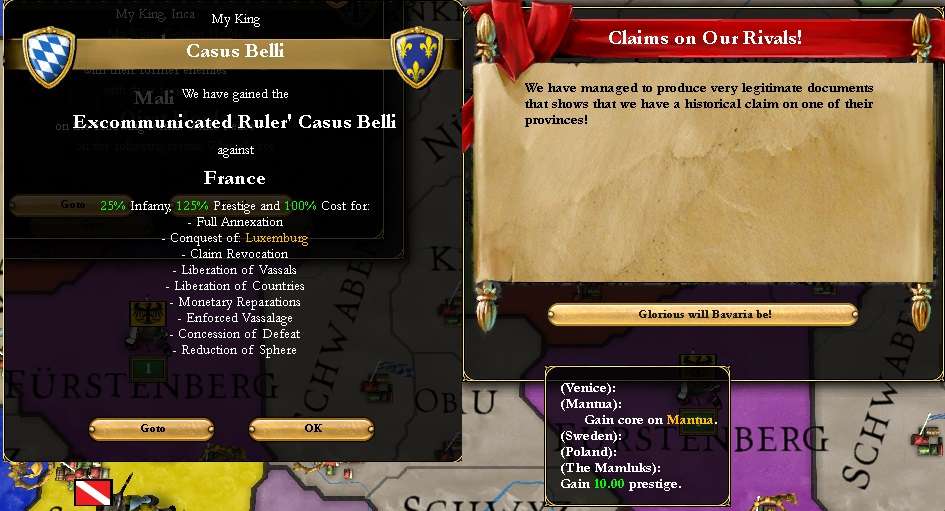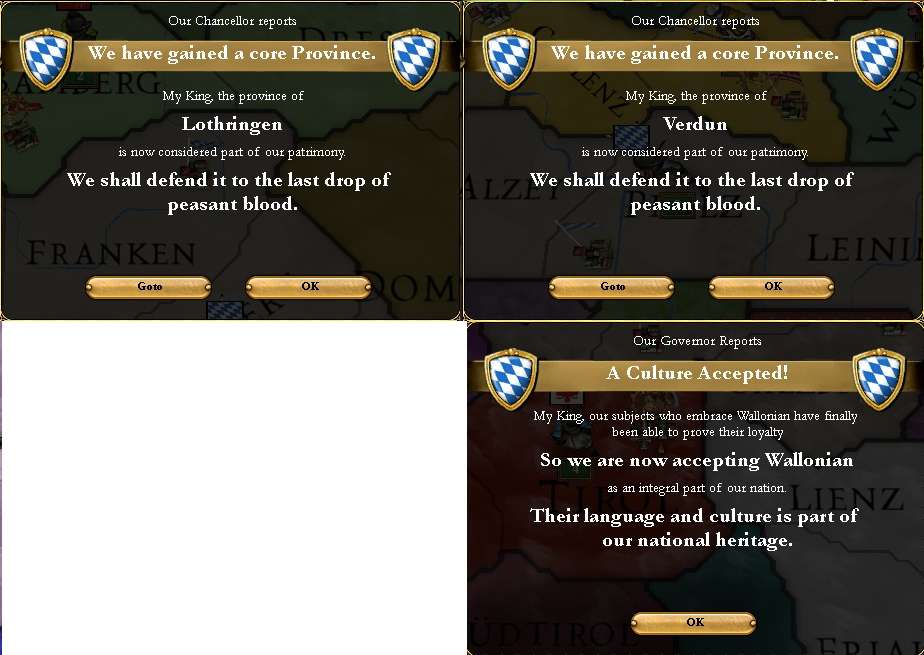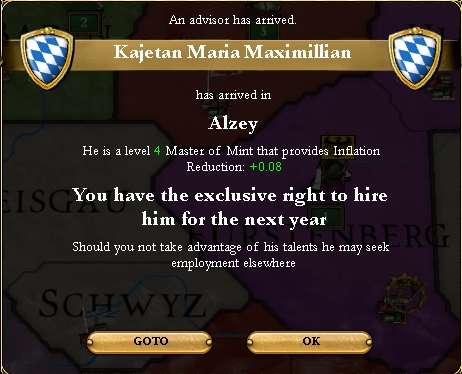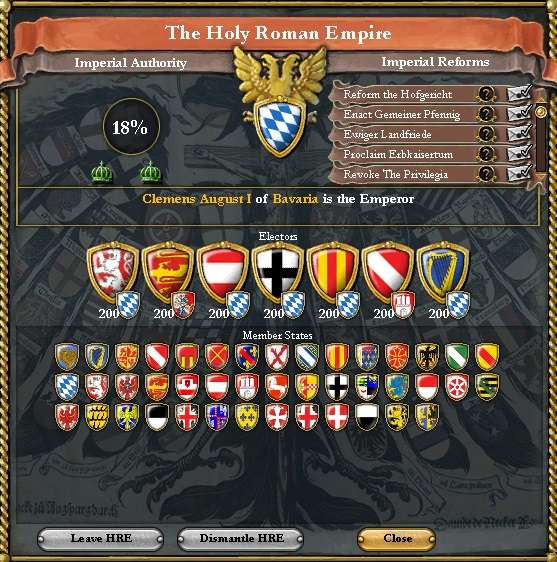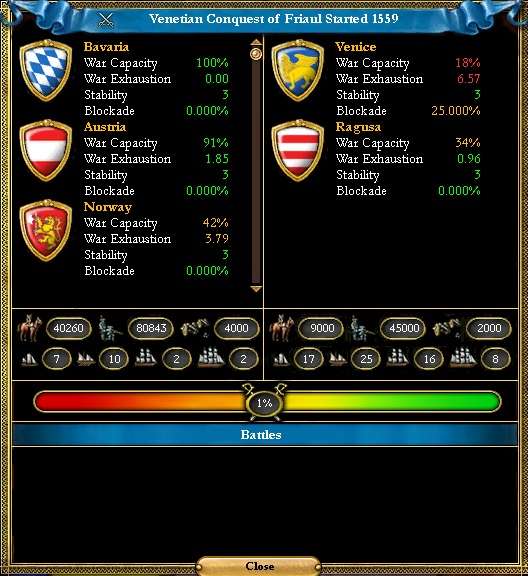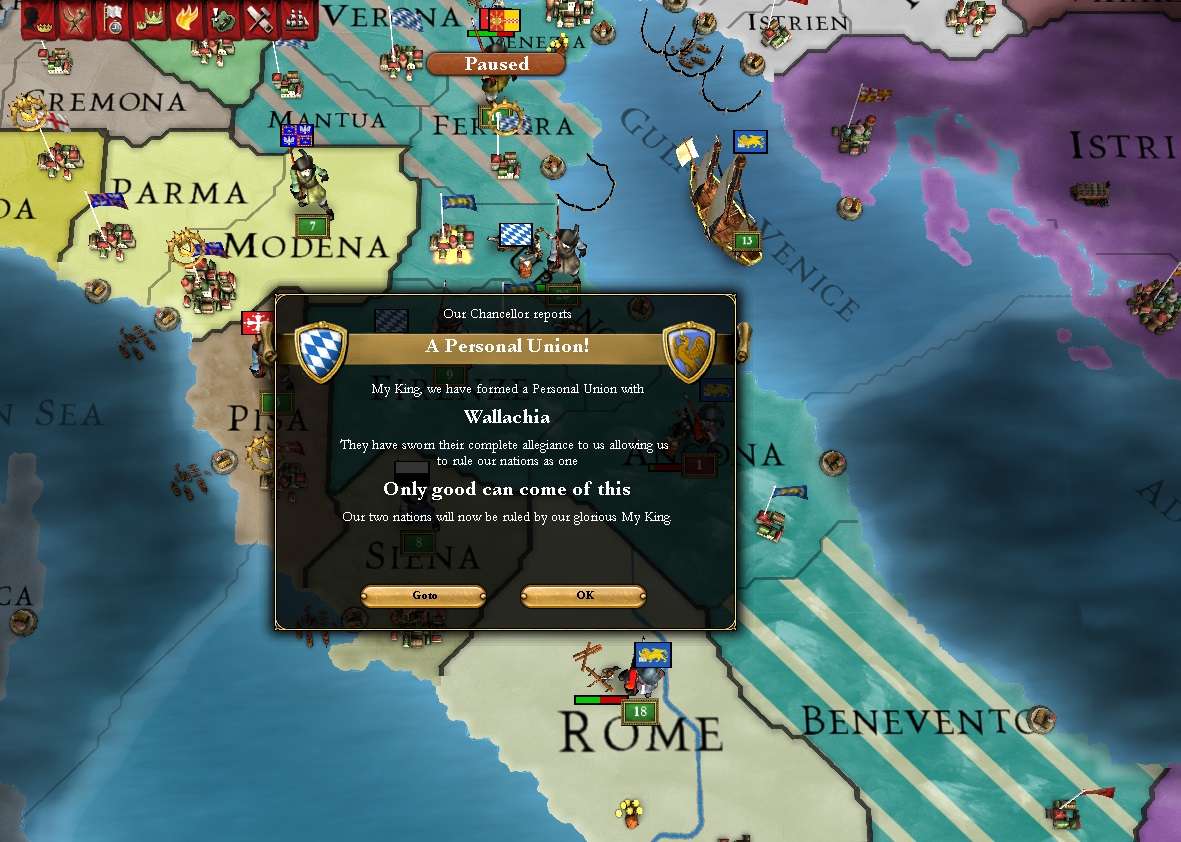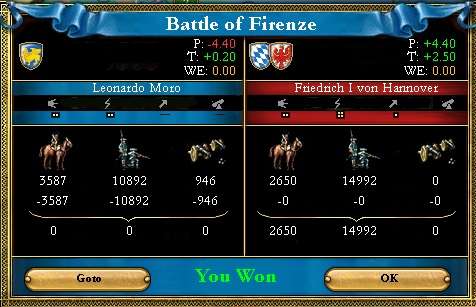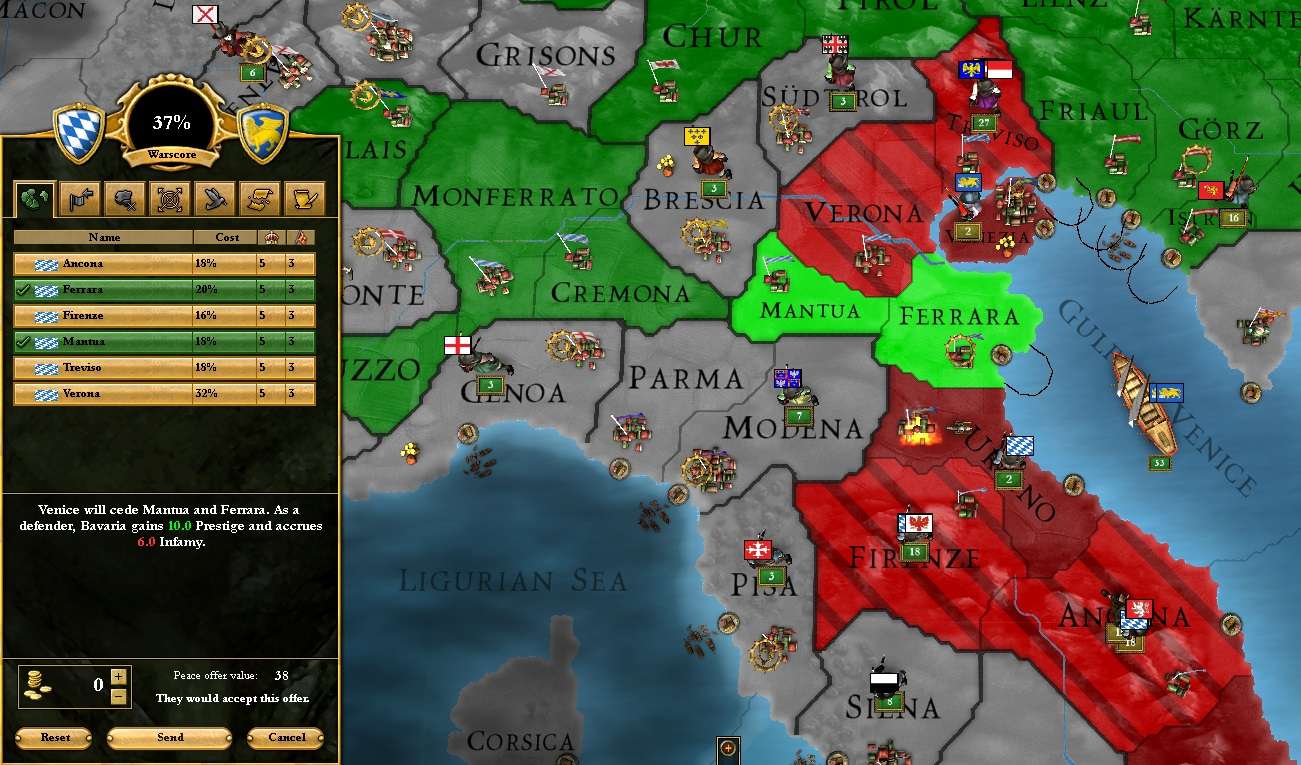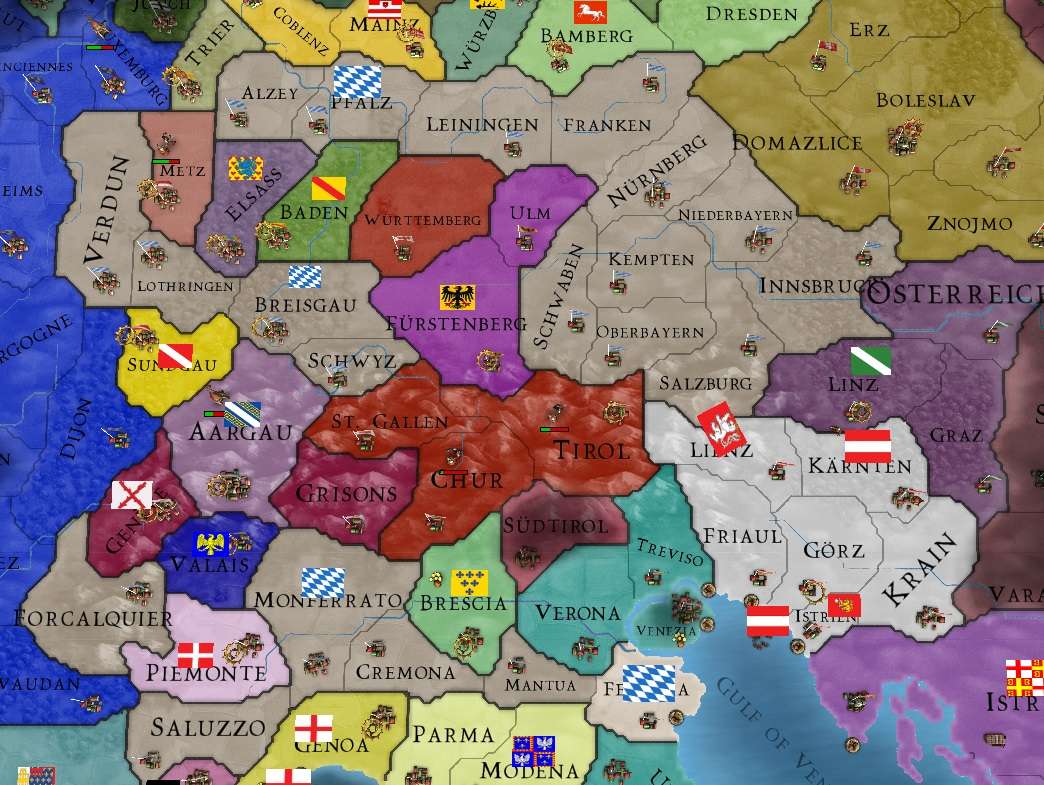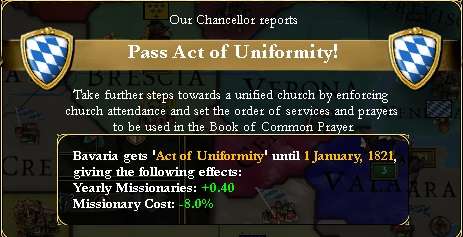Chapter 16: A kingdom turned upside down
1 November 1552, Nürnberg
The crowd gathered, nervously. The König intended to read a proclamation, and given the bloody nature of the aftermath of the French War, it would probably be significant. Perhaps most anxious were the tiny handful of Grafen and Baronen remaining; although none had ever proved the slightest bit disloyal, Clemens the Mad (as many informally termed him) didn't necessarily need a reason. The mutterings grew in volume as the Prinz von Böhmen took the balcony. Prinz Albrecht was as handsome as a marble statue -- and about as intelligent. It was the very incapability of Albrecht that had prevented the rebellion from being even larger than it had been; no matter how tyrannical Clemens was, he was far better than a benign imbecile like Albrecht.
"People of Bayern, rise for your König and Kaiser of the Holy Roman Empire of the German Nation, Clemens I von Hohenzollern!"
Clemens I approached the balcony with a slight smile on his face. His gaze lingered, ever so slightly, on the nobles in front of him. "My subjects, we have undergone many trials. The cowardly French have punished Toulouse, for no reason other than convenience. Their greed and bloodlust shall be punished by our Lord, who promises to judge us all, as he surely judges those disloyal men and women who have recently departed this mortal coil." His sad eyes completely belied the increasingly large grin on his face. He was enjoying himself! "Yet, I am not unmerciful. Indeed, Jesus Christ himself commands mercy.
"So I shall alleviate one concern immediately: I shall do nothing further to the nobility of our glorious kingdom. You will retain your lands, your privileges, and the right to pass it along to your children. So I swear, before God."
This statement triggered a smattering of applause, but most of those assembled were more confused than ever. Abdul Bahar nodded; perhaps alone among the inhabitants of Bayern, he enthusiastically approved of Clemens' actions.
The König continued. "However, I am certain that you all understand that we can never have a rebellion like that again. That is why I am permanently disbanding the
Reichsrat." This had been expected, so the crowd continued to wait for the hammer to drop. "While I would never dream of challenging the ancestral rights of the Bavarian nobility, it is also clear that they cannot rule. Therefore, every province in my realm shall continued to be rule by the Stadtholders, and those individuals appointed solely by me. Any advisor to the crown may be appointed and dismissed at my leisure, and the noble titles that formally attached to those offices given, as a hereditary gift, to those who currently hold them. If their lines should be extinguished, I will redistribute their lands at my prerogative."
Markus Asch tried to smile at the news, that the Aschs would permanently hold the title of Graf von Niederbayern, but he was deeply conflicted. He didn't like how much more powerful Clemens had grown, and especially hated the idea of Prinz Albrecht wielding that kind of power. The König noticed Markus' worried expression and dismissed his concerns: "I will, of course, continue to rely on those individuals who can serve me best. A smaller
Königsrat will meet to advise me on how to deal with the problems of our realm. No one man can deal with such responsibilities. There shall always be a Chancellor, Marshal, and Steward, and they speak with my voice as before."
The crowd fell completely silent. Completely spontaneously, a fellow in the rear the crowd started whispering "Clemens the Just! Clemens the Just!" The whisper turned into a shout; the shout into a roar. Almost instantly, Clemens recovered all of the goodwill he had lost.
Of course, that did not mean that everybody enthusiastically welcomed the new regime. It would be many months before peace and stability were completely restored.
24 July 1554, Salzburg
Louisa von Ulrich frowned at the men surrounding her. They laughed and joked and horsed around with one another.
They are supposed to be doing penance for their sins. God cannot possibly approve of such revelry when there is so much to be done. Louisa was the daughter of the Bishop of Salzburg, and possessed her father's zeal for God. However, she had turned from the purely meditative path of a convent when she met Abdul Bahar at one of his unofficial sermons. Disguised as a boy, the then 15 year old girl had joined the Imperial army. The newly named Louis von Ulrich rose up to the rank of Gefreiter before she was discovered. Disappointed and disowned by her now horrified father, she left Bayern to seek her fortunes elsewhere. She traveled through northern Europe alone, offering her skills as a mercenary, and at best getting offers to be a "camp follower". The increasingly frustrated but still determined Louisa made her way to Holland. For a time, she served a Dutch ship, learning how to fire the cannon, work in the rigging, in general becoming what she had most prayed for, a warrior for God.
Then, like a horrible nightmare, she was expelled from Holland, as were all other individuals of Bavarian birth. The new King of France had inherited Holland and shared his father's distaste for the so-called "German barbarians."
Now 24, Louisa was back home in Salzburg. Her father's see had been given to a more liberal young man while he himself traveled to Rome as a new Papal Nuncio. Of course, no word had been left. She'd tried to use her experiences at sea and on land -- along with a sizable of sum of money she'd acquired -- to raise her own mercenary company. Instead of drilling, they spent most of their time in the taverns or brothels, and orders trying to get them to their posts were usually disdainfully ignored. She was about to try again when a royal messenger approached her.
"Are you Gefreiter von Ulrich, milady?"
Louisa looked with some suspicion -- nobody had used her military rank in years. "I am."
"You have been summoned to an audience with König Clemens. You are to attend him in two weeks."
"Of course. My company?"
"No, milady. Just you."
"As you wish. I shall be there."
2 November 1555, Nürnberg
As the statue of Ernst Riedesel was erected, Louisa von Ulrich drew herself up to attention, just as all the other veterans around her did. She smiled at Abdul Bahar -- although age had slowly started to cripple the once proud warrior, he had not lost none of his fire.
Abdul nodded gravely in return. His son Clemens -- about 10 years old now -- bowed more formally. It was not the bow that a mere Gefreiter would have received:
It was the bow a Queen would have received.
It was among the most poorly kept secrets in Bayern that she was the König's consort. Queen Dorothea, for all of her official title and grandeur, spent most of her time ruling in Aquelia -- the people of Aquelia did not trust foreigners, and much preferred an Italian to rule over them. Louisa was originally going to be given a ceremonial commission in the König's guard: instead, she ended up carrying his child. Prinz Albrecht had died, tragically, in a horse riding accident at the end of 1554 and the König sought comfort in the lovely Louisa.
She did her best to waddle back to the Schloss von Hohenzollern. Things were already much more peaceful and stable in Bayern, and the chivalry of the young men only seemed to emphasize that. The coffers, full of gold, now went to improving Marshal Asch's army, a task she well approved of.
All of a sudden, she dropped to her knees and screamed. The gentlemen escorting her carried as quickly as possible to the doctor's small office down the street; a messenger sent for the König. After a fifteen hours grueling of labor, she smiled as she held her son... and her daughter... and her second son! Clemens was very pleased to see three beautiful and healthy children. In honor of his beloved paramour, he named the oldest boy Alois Johann.
The girl was named for Louisa's mother, Alarice. The younger son was, indirectly, named after her as well -- he took the name Ulrich. Already, the feisty little youngster was fighting for his mother's and father's attention. For he truly did have a father: Clemens had legitimized all three of his new children, and they proudly bore the name von Hohenzollern. It was sad, but understandable, that Louisa was a little bit jealous of her children.
11 February 1557, Schwaben
Marshal Markus Asch grunted as he watched the troops drilling. Tensions with Bayern's neighbors had never been higher. France found itself at the end of a Papal Excommunication. While Bayern still legally had a truce with France, that didn't mean fighting might not spill into Bavarian territory.
While the nations of Europe considered their response to France's heresy, Adolph von Ungern earned himself plenty of accolades by discovering ancient claims on Venetian soil. Clemens I wanted a fight he could win to restore the Empire's confidence in their Bavarian protectors, and defeating Venice would prove a very nice boost in that regard. In the meantime, though, Markus found himself focusing on something else altogether: introducing huge numbers of new troops. The Wallonian inhabitants of the former provinces of Lorraine had formally been given citizenship thanks to a decree from the Kaiser.
Markus certainly wasn't complaining: at the moment, he had a mere 30,000 troops to defend the realm. No matter their strange language and culture, the new recruits were welcome.
12 November 1558, Alzey
The ex-Steward, Anton Dulac, had transformed the realm's economy, and his reward had been to die peacefully, at home, surrounded by his loved ones. The new steward had lived a life altogether different.
Kajetan Maria Maximillian had a very inauspicious beginning. As an infant, he'd been abandoned at a church in Pfalz. He knew his father was a Polish soldier (hence his first name), but nothing else. He'd grown up at the Bishopric of Pfalz with no surname. By the time he was old enough to go to school, however, one thing he had was a genius for mathematics. He was mentored by a famous economist named Maria Maximillian Koblenz, and adopted his mentor's name as his own unique surname. He returned to Pfalz, helping to raise funds for religious education in his adoptive homeland. When Pfalz renounced Protestantism -- the last Bavarian province to do so -- Kajetan knew it was time to move on.

At the advice of his mentor, Kajetan moved to Kärnten, the capital of Österreich, to serve in Herzog Maximillian's court. Unfortunately, the death of the Herzog by stroke quickly sent the young Pole back home. Frustrated, he found employment in a counting house in Alzey when he received the royal summons to take up the post of Steward. It seemed that the Herzog's last official act as Elector of Österreich was to recommend Kajetan to the post; the new Elector happily confirmed his father's suggestion and at the latest meeting of the Electors, Clemens introduced Kajetan as the new Steward. The Elector of Ireland had hoped to put his own son in such a prominent position, but understood.
However, Kajetan's life wasn't about get any easier. He had a war to pay for.
1 May 1562, Ferrara
For the first time since she'd left Holland, Louisa von Ulrich felt the salty breeze of the sea on her brow. Bayern had a port, at long last, and access to the Adriatic.
Nobody had expected Venice to attack Österreich, but the decision was a welcome one. Bayern alone had almost 40,000 troops, and the rest of the Empire was only too eager to supply men and munitions for the Empire's glory.
To emphasize that Venice was facing the Empire, not just Bayern, the renowned Friedrich I von Hannover was given overall command of the Imperial armies, but only on the condition that Louisa von Ulrich accompany the army as the Kaiser's personal representative. When she wasn't strategizing with Friedrich I, she was arranging a match for Alois; her seven year old son was married to eight year old Adriana, the daughter of Wallachia's recently fallen king; Clemens was named regent in his son's name.
She proved every bit as skillful on the battlefield, leading a small squadron of cavalry around Venetian lines, capturing an entire regiment of artillery in the great rout at Firenze.
As a reward for her loyal service, Louisa was named Contessa di Ferrara. Knowing that her younger son would be taken care of no matter what was a very welcome feeling.
Venice was cut in half, excellent news to be sure, as she reviewed the latest map of the realm.
So many of her dreams were coming true; all except one. That one dream, sadly, was doomed to remain just that.
13 November 1563, Nürnberg
If Clemens I's funeral had happened ten years earlier, it would probably have been a joyful occasion, as the so called "Clemens the Mad" was interred in the Hohenzollern family crypt. Instead, it was one of the largest and most sorrowful in Bavarian history. Königin Dorothea was the sole noble in the entire Empire who chose not to attend; doubtless it was because Clemens had named Louisa Regent until Alois came of age. She never did get to be Königin, but knowing that her man had loved her so much as to entrust her with the kingdom was about as much as anybody could ask for.
The last few months of his reign had been very peaceful. The new Protestant provinces added to the kingdom convinced him to issue a formal decree requiring every church in the realm to use the same book of prayer -- a measure calculated to draw more and more men to the cloth.
Clemens' closest friend, Marshal Markus Asch, was represented by his seventeen year old son Wilhelm. Wilhelm was one of the very first sailors in the nascent Bavarian Fleet; it currently had no ships, but plans were being drawn up for a magnificent flagship as they spoke. One of Louisa's many roles was to ensure that the navy succeeded, which meant carefully trained seamen and officers. Wilhelm's father, Markus, had been named Ambassador to Ireland following his retirement as Marshal. The new Marshal, Engelbert Hafenbrädl, had been Markus's chief of staff ever since the War with France; the 46 year old native of Franken was expert in all forms of firepower, but especially skilled with cavalry.
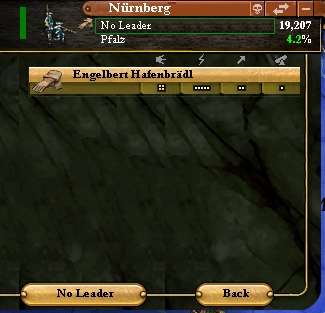
Louisa briefly smiled in acknowledgement at the Marshal, but her heart was breaking as she saw her lover interred in the family crypt. Her eyes brimmed over with tears as the telltale glint from Gotteszorn reminded her of his final promise: the bloodsoaked heirloom of his kingdom would be buried with him, to symbolize a kinder, gentler future for their three beloved children. The gesture was a lovely one, but even Louisa knew it was futile. Even before Clemens was completely buried, a rebellion rose up in Leiningen. Not a very large one, but the simple fact that his promise couldn't even be kept for a day brought on a fresh wave of tears.

It certainly felt good to take some land from somebody; it's the first time I've gotten to do that in a while. I don't intend to go too far south into Italy, but I do want to take Verona and Treviso. If I could somehow get Venezia itself, that would give me the COT I've wanted for a while. I don't even know if it would be wise to build my own; it's something to think about.
Next update should be Tuesday or Wednesday!


